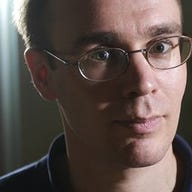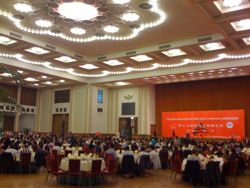Sir Tim Berners-Lee addresses WWW2008 in Beijing


Berners-Lee began by remarking on the notion that the Web is 'done', commenting that we are experiencing a period of rapid change and noting that, as the number of people connected to the Web continues to grow, the way the Web works - and the Web itself - will also transform yet further.
In a prepared and often carefully worded speech that referred many times to the need for freedom, openness and shared understanding, Berners-Lee stressed the need for different groups to communicate with one another at events such as WWW2008. He argued that we are all members of many overlapping communities, bringing different interests and varied perspectives to issues of interest. Within each of these communities, we develop terminology and language that plays a (perhaps unintended) dual role in clarifying and speeding dialogue within the community, whilst increasing the disconnect between a community's established members and newcomers or outsiders. The Web, he suggested, played an important role in making it easier for these communities to communicate with one another; it was an important tool in breaking down the walls that we erect around these various subject, language, and national groupings.
"The Network," Berners-Lee asserted, "is magic. It removes [the barrier of] distance." He was quick to acknowledge that other 'barriers' such as timezones, language, and culture remain... and that many are an essential aspect of our civilisation that he would not wish to 'remove'.
"Humanity is a tangle, which the Web lets us see"
Cultural and linguistic diversity is an asset. Diversity, Berners-Lee argued, "is important, until it becomes too great."
In front of this friendly audience, Berners-Lee asserted that the Web is a complex and evolving organism; one that is increasingly attracting research in its own right. The Web Science Research Initiative (WSRI), for example, seeks to bring together researchers in computer science, psychology, sociology, economics and more. Just as cognitive science unifies research into the human brain, so web science unifies research into the Web.
We know, he argued, that the brain is complex, "yet there are more pages on the Web than neurons in the brain"... and the Web continues to gain pages whilst brains lose neurons as we age.
Building upon his opening premise, Berners-Lee described the Web as a 'social machine', pointing to 'machine-enabled social interaction' from sites such as Dopplr, Wikipedia and others; sites that use the Web to allow existing groups and communities to work together better. He stressed the importance of this social machine, whilst making it clear that its current manifestation remains primitive.
As in his podcast with me earlier this year, Berners-Lee singled out the data policies of first generation enablers of social interaction, lambasting them with;
"They grab your attention... [then they] horde your data"
"I would prefer that they exported the data using the Semantic Web, so that you could use all the data"
Perpetuating current data silos by continuing to "give your data to a site" was, Berners-Lee asserted, "not ideal." He argued instead for wider adoption of new or existing Web specifications such as OAuth and RDFAuth, enabling the individual to store data relevant to themselves wherever they felt fit, and assemble it at will within one or more Web and local applications of their choosing at the point of need.
"Acquaintance-based social networks," Berners-Lee suggested, were "the tip of the iceberg," with his notion of the emerging Giant Global Graph "exist[ing] above the Web" and creating opportunities for far richer functional and role-based interconnections.
Turning to consideration of the Web itself, Berners-Lee remarked that
"Openness tends to be an inexorable movement through time"
He juxtaposed the 'Web Application Platform' with proprietary solutions to parts of the problem such as Flash, AIR and Silverlight. This Web Application Platform, he argued, relies upon W3C specifications and other open standards, and it is increasingly moving toward specifications that are small, modular, and interoperable.
Moving toward his conclusion, Berners-Lee reiterated the importance of Linked Data again saying
"Linked Open Data is the Web done as it should be."
Returning to his earlier discussion of modularity, he suggested that existing specifications such as those for JavaScript be reworked, carving JavaScript's functionality up into a series of modular packages. Each of those packages should then be assigned a URI, and the Semantic Web should be used to describe the packages, their dependencies, and their interrelationships.
Used in conjunction with the resulting applications, Linked Data would provide,
"elements of an ability to do things [with data] that cross application boundaries."
Turning to Q&A, Berners-Lee was first asked to comment on the concept of 'Web 2.0', which he did;
"Web 2.0 sites are silos."
"A centralised solution cannot compete with a decentralised one in the long term... If we have to call anything 'Web 3.0', it will be when social pressure forces these sites to let go of your data."
Berners-Lee mused that we might see a two-tier Web emerge, with a class of sites facilitating the storage and supply of data and a second set providing the tools to let us mash data from various places together.
A subsequent questioner described the Web as the 'most important invention of humanity.' Leaving aside little things like the wheel, irrigation, writing, and more, I can't help feeling that he was possibly overstating Berners-Lee's achievement. The Web is important. The Web is transformative. The Web is empowering. But our 'most important invention' ? I think not.